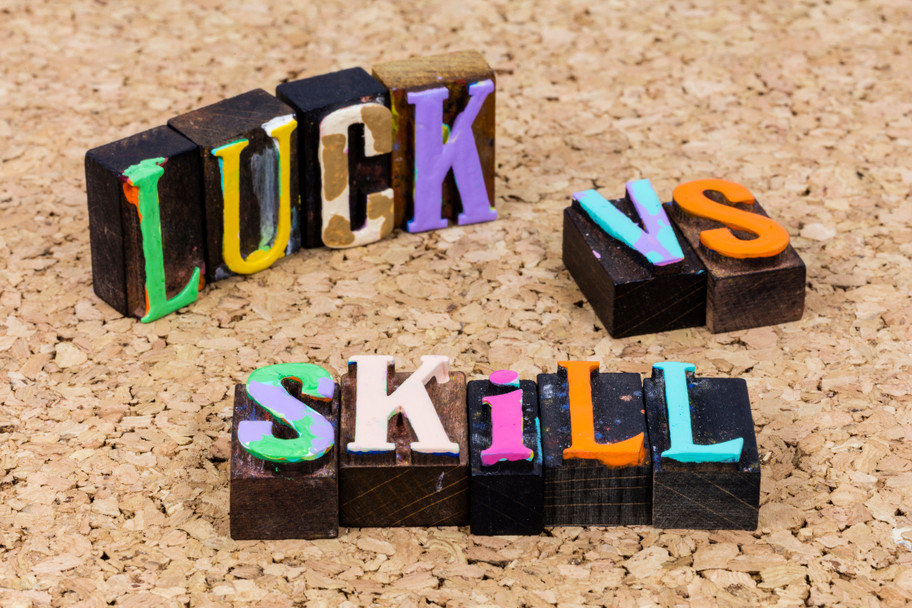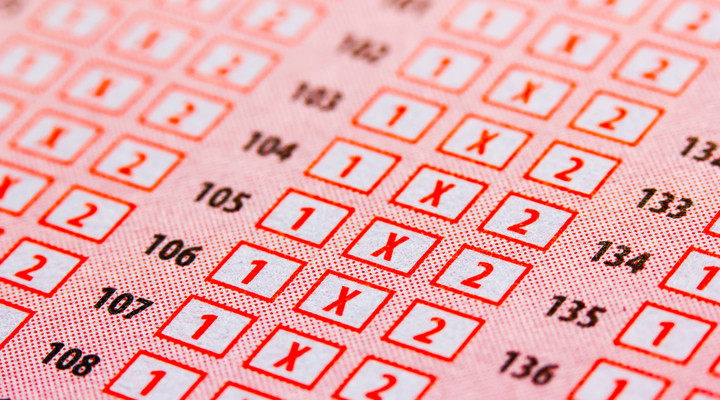Luck vs skill in gambling: finding the balance

The age-old debate between luck and skill in gambling continues to captivate players, researchers, and industry professionals alike. While some view gambling as purely a game of chance, others argue that strategic thinking and analytical skills can significantly influence outcomes.
This complex relationship varies dramatically across different forms of gambling, from the calculated world of poker to the random spins of slot machines.
Check out the best UK bookmakers to claim free bets worth up to £850!
Understanding where luck ends and skill begins isn't just an academic exercise—it's crucial knowledge for anyone looking to engage with gambling responsibly and effectively.
The distinction between these two forces shapes everything from legal classifications of gambling activities to personal betting strategies and long-term expectations.
The relationship between luck and skill in gambling
The fundamental tension between luck and skill creates a spectrum that defines virtually every gambling activity.
At one extreme lie games of pure chance, where no amount of knowledge or strategy can influence the outcome beyond the initial decision to play.
Lottery tickets, slot machines, and roulette wheels fall into this category, where each event operates independently of previous results and player actions. Mathematical probability governs these games entirely, with house edges built into their very structure.
At the opposite end of the spectrum exist games where skill can significantly influence outcomes over time. Poker stands as the prime example, where psychological insight, mathematical calculation, and strategic thinking can create substantial advantages for skilled players.
Professional poker players consistently outperform casual participants not through luck, but through superior decision-making, bankroll management, and emotional control.
Similarly, sports betting allows knowledgeable bettors to identify value in betting lines through superior information analysis and market understanding.
Most gambling activities, however, exist somewhere between these extremes. Blackjack combines elements of both luck and skill, where basic strategy can reduce the house edge significantly, yet card distribution remains random.
Even skilled blackjack players cannot overcome the mathematical disadvantage in the long run without additional techniques like card counting, which many casinos actively prevent.
This middle ground creates the most interesting dynamics, where players can improve their odds through skill while remaining subject to variance and chance.
The psychological appeal of the relationship between lady luck and skill cannot be understated. Players often attribute wins to their skill and losses to bad luck, a cognitive bias that fuels continued play.
This self-serving attribution helps explain why many gamblers believe they can beat games that are mathematically designed to favour the house.
Understanding the true balance between luck and skill in any given game is essential for maintaining realistic expectations and making informed decisions about gambling participation.
Sports betting vs casino wagering: a tale of two approaches
The distinction between sports betting and traditional casino games reveals fascinating differences in how luck and skill interact within gambling environments. Sports betting offers unique opportunities for skilled analysis that simply don't exist in most casino games.
Successful sports bettors can gain edges through superior knowledge of teams, players, weather conditions, injury reports, and historical performance patterns. They can identify discrepancies between their calculated probabilities and the odds offered by bookmakers, creating positive expected value opportunities.
Unlike casino games with fixed mathematical house edges, sports betting markets are more dynamic and inefficient.
Bookmakers must set lines for thousands of events across numerous sports, creating opportunities for sharp bettors to find favourable situations. Professional sports bettors often specialise in specific leagues or bet types, developing expertise that casual bettors cannot match.
They may focus on obscure markets where bookmakers have less information, or they might identify systematic biases in how odds are set for certain situations.
Casino wagering, by contrast, operates in a more constrained environment where the mathematics are clearly defined and heavily favour the house.
While games like blackjack and video poker allow for optimal strategy that can minimise losses, the fundamental structure ensures that sustained play will eventually favour the casino – the house ultimately wins.
Slot machines, roulette, and most table games offer no legitimate strategic advantage beyond knowing when to walk away.
The house edge is built into every spin, every hand, and every roll, creating a mathematical certainty over sufficient trials.
However, casino games do offer one advantage that sports betting cannot: predictable variance and known probabilities.
A skilled blackjack player knows exactly what their expected loss rate will be over time, while even the most skilled sports bettor faces unknown variables and changing market conditions.
This predictability allows for more precise bankroll management and clearer long-term expectations, even if those expectations involve accepting guaranteed losses in exchange for entertainment value. My colleague Charlon Muscat covers this in more detail in his blog about how he learned to 'win' at online slots.
Read: Can chaos theory beat the house?
Will AI transform the luck-skill dynamic?
Artificial intelligence is rapidly reshaping the gambling landscape, creating both opportunities and challenges for the traditional relationship between luck and skill.
In sports betting and iGaming, AI systems can process vast amounts of data far beyond human capabilities, analysing player statistics, weather patterns, historical matchups, and countless other variables to identify betting opportunities.
Professional betting syndicates already employ sophisticated algorithms that can spot market inefficiencies within seconds of odds being posted, potentially making it increasingly difficult for individual bettors to find profitable opportunities.
The democratisation of AI tools presents interesting possibilities for recreational bettors.
Machine learning platforms can help identify patterns and value bets that might escape human analysis, potentially levelling the playing field between casual and professional bettors.
However, this same technology allows bookmakers to set more accurate lines and adjust odds more quickly, potentially reducing the market inefficiencies that skilled bettors traditionally exploit.
The result may be an arms race where the advantage goes to whoever has access to the most sophisticated AI systems and the largest datasets.
In casino gaming, AI's impact is more limited but still significant. While the fundamental mathematics of games like roulette and slots remain unchanged, AI can enhance player tracking systems and personalise gaming experiences in ways that may influence gambling behaviour.
Casinos are increasingly using AI to identify problem gambling patterns and optimise their marketing strategies, potentially making their games more engaging and harder to resist.
Perhaps most intriguingly, AI may help players make better decisions about when and how much to gamble.
Smart bankroll management systems powered by machine learning could help players stick to predetermined limits and identify when they're making emotionally-driven decisions rather than rational ones.
This technology could shift the skill component of gambling away from game-specific knowledge toward better self-management and discipline.
The ultimate impact of AI on gambling may be to compress the middle ground where skill and luck intersect.
Games may become either more purely skill-based as AI enhances analysis capabilities, or more purely luck-based as AI eliminates market inefficiencies.
This polarisation could fundamentally change how we categorise and regulate different forms of gambling.
Tips to increase your chances of success in gambling
• Master bankroll management: Set strict limits on how much you can afford to lose and never exceed them, regardless of whether you're winning or losing
• Choose games with the lowest house edge: Focus on blackjack with basic strategy, baccarat banker bets, or craps pass line bets rather than high-house-edge games like keno or side bets
• Learn optimal strategy for skill-based games: Study basic strategy for blackjack, understand poker fundamentals, or develop expertise in specific sports for betting
• Shop for the best odds: Compare lines across multiple sportsbooks or seek out casinos with favourable rules and lower house edges
• Avoid the gambler's fallacy: Remember that past results don't influence future outcomes in games of chance – this means that each spin, roll, or deal is independent
• Take advantage of bonuses wisely: Understand wagering requirements and terms before accepting casino bonuses or promotional offers
• Practice emotional discipline: Never chase losses with bigger bets, and don't let winning streaks lead to overconfidence and poor decision-making
• Keep detailed records: Track your wins, losses, and betting patterns to identify strengths, weaknesses, and long-term trends in your gambling performance
• Specialise rather than diversify: Develop deep knowledge in one area rather than spreading your attention across multiple games or sports
• Know when to walk away: Set both win and loss limits before you start playing, and stick to them regardless of the situation
Technological advances
The interplay between luck and skill in gambling will continue evolving as technology advances and markets become more sophisticated.
While AI and data analytics are changing the landscape, the fundamental human elements of discipline, emotional control, and sound decision-making remain crucial for anyone engaged in gambling activities.
Understanding where skill can provide an edge and where luck dominates is essential for maintaining realistic expectations and gambling responsibly.
Success in gambling, where possible, comes not from eliminating luck but from amplifying skill within the constraints that chance provides.
Whether you're a casual player seeking entertainment or someone looking to apply strategic thinking to gambling, recognising this balance is the foundation of any sustainable approach to wagering.






 EXPLAINED: In-play football betting strategies
EXPLAINED: In-play football betting strategies
 What is a placepot and how does it work?
What is a placepot and how does it work?
 What is a sports betting strategy?
What is a sports betting strategy?
